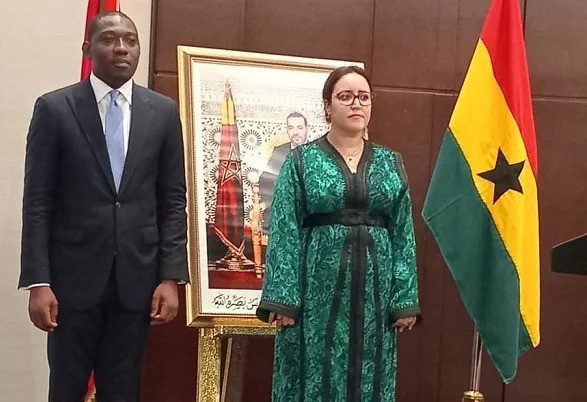Ghana and Morocco have resolved to deepen their ties at both the bilateral and multilateral levels for the mutual benefits of both countries.
The Moroccan Ambassador to Ghana, Imane Ouaadil, and Ghana’s Minister of State at the Ministry of Energy, Herbert Krapa, made the resolve on Tuesday in Accra.
They were speaking at a reception to mark the 25th anniversary of His Majesty King Mohammed VI ascension to the throne as King of Morocco, attended by the Moroccan community in Ghana, members of diplomatic corps, some ministers of state, Members of Parliament, traditional and religious leaders, among others.
Mrs Ouaadil said “the economic ties between our two countries are developing dynamically and we maintain outstanding cultural and academic collaboration, which are the fundamental drivers of a fruitful cooperation.
The relationship between our two countries is in many respects stronger now than it has ever been and I look forward to continue building on this relationship to develop an even closer partnership of equals across the different sectors of mutual interest.”
Mrs Ouaadil said King Mohammed VI had a clear vision of the importance of African integration, explaining that under his reign, Morocco had strengthened its relations with many African countries, including Ghana, through his personal visits to these countries and signing cooperation agreements in various fields such as agriculture, health, education, and infrastructure.
Touching on the significance of the day, Mrs Ouaadil said “our celebration today pays tribute to the remarkable transformation the Kingdom has experienced under his Majesty’s leadership over the past 25 years.”
The Ambassador added that since ascending to the throne in 1999, Mohammed VI had led Morocco through an ambitious economic and social transformation.
“Over the past 25 years, Morocco, a thousand-year-old country at the crossroads of cultures, has experienced remarkable economic growth and structural reforms have been implemented to innovate, attract foreign investment, and modernise infrastructure,” she emphasised.
Mrs Ouaadil pointed out that Morocco was committed to economic reform and working hard to strengthen its economic resilience, but also to position itself as a beacon of sustainable development, saying “Central to Morocco’s long-term prosperity is its New Development Model, which focuses on social protection, inclusiveness, and gender equality.”
Building on its location on the crossroads between Africa and Europe, the Ambassador said Morocco attracted investments by automobile giants in Tangier, Casablanca, and Kenitra and by 2026, Morocco, which is already Africa’s top car producer, would be able to double its current production capacity to 1.5 million cars. The country’s automotive sector is also preparing for the shift to electric mobility.
The Minister of State at the Ministry of Energy, Herbert Krapa, said both countries had a rich history, vibrant presence and a promising future, strong diplomatic, economic and cultural ties.
“We continue to collaborate at the bilateral and multilateral levels for our mutual benefits, under the belief that by working together and supporting each other, we can overcome the challenges we face,” Mr Krapa said.
Mr Krapa added that Ghana had laid the foundation for enhanced cooperation with Morocco in crucial areas such as agriculture, energy and tourism.
To this end, the minister urged Moroccan businesses to invest in Ghana and explore new investment opportunities through the African Continental Free Trade Area initiative.





